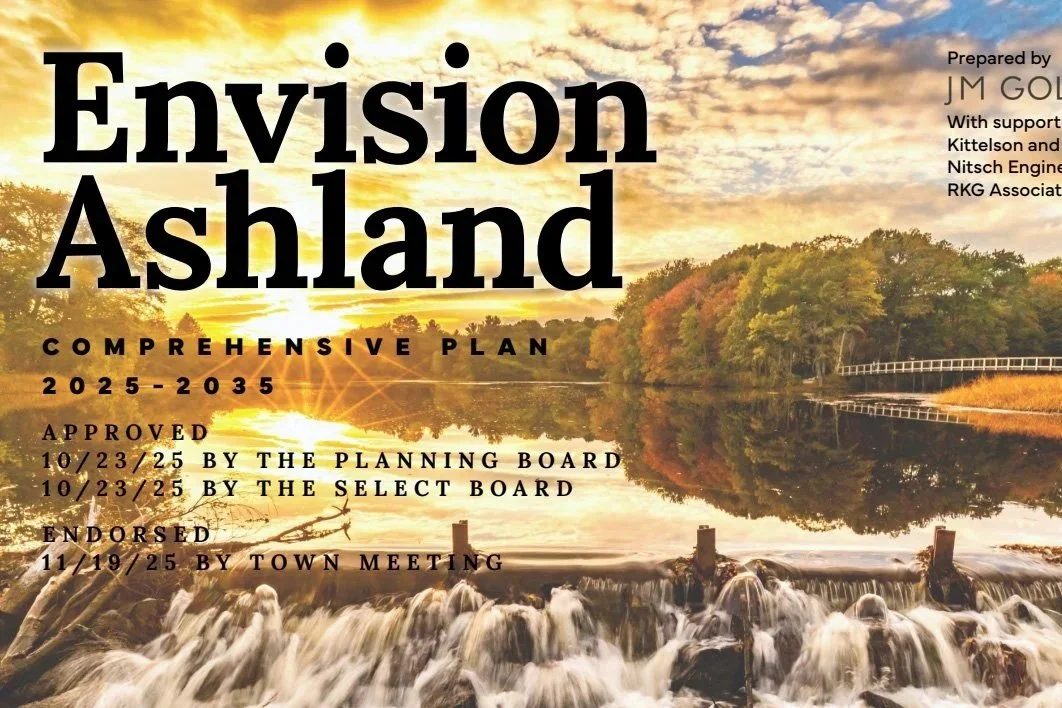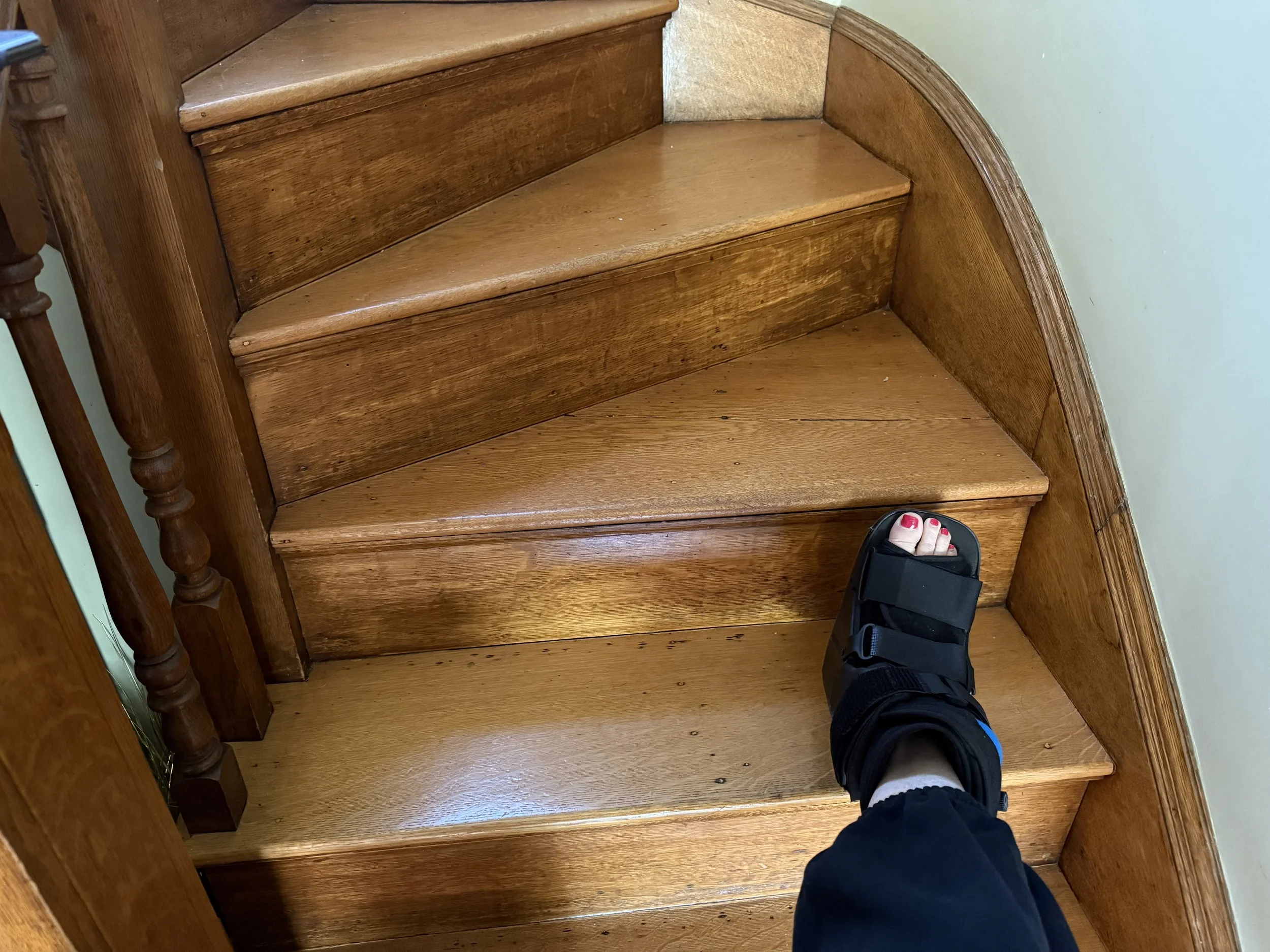Dear Younger Me, Here’s What I’ve Learned Alongside You.
WRITTEN BY
Laura Smead, AICP, Principal Planner & Operations Coordinator
In my role as a supervisor on the JM Goldson team, mentorship is important to me. I’ve learned a lot along the way both in my own career and in mentoring our JM Goldson team members. One thing I’ve learned is that whether you’re fresh out of graduate school or well into your career, planning has a way of keeping you humble. There are moments, sometimes in the same day, where you feel both deeply needed and totally in over your head.
Looking back on more than a decade in this field, I wanted to offer something a little different: a letter to my younger self. This reflection is part encouragement, part love letter to the messy, beautiful work of community planning, and a reminder that the path isn’t always linear. If you’ve ever wondered whether you belong in this field, you’re not alone.
Here’s what I’ve learned along the way.
The first year is always the hardest.
So, it’s your first day as a town planner.
You’re in your new office, surrounded by folders full of files left behind by your predecessor, most of which are labeled things like “CCEOD_OLD” or “ZBA Final FINAL.” People have been trickling in to say hello. You’re figuring out where the coffee is and how the printer works.
And then the Planning Board chair walks in and drops your very first “assignment”: Write an RFP for a market feasibility study for a property the town wants to redevelop.
You smile and nod like you know what he’s talking about.
But as soon as he leaves, you Google: “What is an RFP?”
Spoiler alert: this won’t be the last time you pretend to know something you don’t (yet). It also won’t be the last time you figure it out, learn fast, and get it done. Because it turns out that being a planner means you’ll get a crash course in everything: grant writing, municipal procurement, community engagement, board relations, project management, zoning, and yes, those RFPs. So many RFPs.
And here’s the first thing I want you to know: the first year is always the hardest.
We thought we didn’t belong, remember? In every new job, at every new table, you’ll hear a voice inside whisper, “Why did they hire me?” The learning curve will feel steep. You’ll feel like a fraud. But here's the truth: everyone feels that way at first.
That self-doubt? It’s just part of growing.
Eventually, the things that once seemed impossible will become second nature. You’ll go from barely understanding a site plan review process to explaining it to a room full of residents. You'll navigate bylaws, public meetings, and policy recommendations like you were born doing it. One day you'll realize you're mentoring someone else through their own “I have no idea what I’m doing” phase and you’ll mean it when you tell them, “It gets better.”
It’s Okay to Change Your Mind
At first, you feel like you’re supposed to choose a niche (transportation, climate change, public health). And sure, some people thrive when they go deep in one area. But that’s not how your brain works. You’re going to fall in love with planning because of its range. Its mix of technical and interpersonal. Policy and people.
You’re going to “try on” a lot: an internship at the Cambridge Community Development Department, then a research role at Harvard’s Graduate School of Design where you co-author a book and mentor grad students. You'll learn how to synthesize ideas and build frameworks and eventually realize you're itching to be in the arena, not just analyzing from the sidelines.
You’ll shift into a municipal planning role, and it’ll be equal parts rewarding and maddening. You’ll grow to appreciate zoning (even if it feels like a legal labyrinth at times). You'll learn how much of local planning is really about building relationships and trust, especially when your bosses are elected officials. You'll get tired of watching the consultants get to do all the "fun stuff" while you chase grant deadlines.
And then, you’ll say yes again to a small consulting firm called JM Goldson and it’ll turn out to be a kind of sweet spot. A space where you get to wear all your hats, meet new communities, keep learning, and balance the policy wonkiness with real-world application. It’s not what you pictured when you started, but it’s better in ways you didn’t know to hope for.
None of this happens because you picked a lane. It happens because you stayed open. So don’t worry if your path isn’t linear. Careers aren’t ladders; they’re jungle gyms.
You’ll Learn What Matters Most
Here’s one you’ll learn the hard way: don’t work somewhere that asks you to leave your authenticity at the door.
Sure, in your first months in a new role, you’ll need to “fake it ‘til you make it” a little (confidence comes with time). But there’s a big difference between learning your role and suppressing your values. If you ever find yourself constantly second-guessing whether it's safe to speak up, or if you’re asked to compromise your integrity to fit in, listen to that discomfort. You don’t need to be everyone’s favorite. But you do need to feel like yourself.
At the same time, remember: the grass isn’t always greener. Every job has trade-offs. Culture matters as much as day-to-day tasks. When you’re evaluating a new opportunity, pay attention to how people treat each other, how decisions are made, how dissent is handled.
Those “soft” dynamics shape your professional happiness more than the job description ever will.
Planning is Messy. And Beautiful.
Planning is often about possibility, not execution. That means you’ll spend a lot of time crafting frameworks, setting goals, and building consensus, not necessarily cutting ribbons. And that’s okay. It’s the work upstream that makes the downstream possible. But it’s rarely clean.
In Massachusetts, the people have a lot of power, more than they often realize. You’ll see town meetings become the purest form of direct democracy and also the most frustrating. You’ll witness moments of grace, where a community rallies around an idea, and moments where a few entrenched voices derail years of careful work.
You’ll learn that community engagement is both essential and incredibly hard. You’ll try surveys, forums, mailers, yard signs, community ambassadors, tabling, and Facebook ads and still struggle to hear from the “not-usual suspects.” Sometimes the loudest voices in the room don’t reflect the wider community. Sometimes they do, but they’re divided. Community isn’t one thing. It’s many voices, often disagreeing. That doesn’t mean you’ve failed. It means you’re doing real work.
You’ll sit in public meetings where people say words like “communist” or “those people” out loud and feel your stomach drop. But you’ll also hear voices, shaking with nerves, speak from the heart about their housing needs, or their children’s, and how this plan finally made them feel seen. These moments won’t make the work easier, but they’ll remind you why it matters.
Planning is slow. Sometimes excruciatingly slow. Like the saga of your own town’s library. It started with a vote at town meeting just to fund a study. That was ten years ago. In the time between, the project was stalled by lawsuits, delays, and yes, your town suing itself. Yes, that can happen! For example, the library trustees suing the zoning board of appeals over a variance denial! Despite overwhelming public support for the project. It was infuriating. But in May, the new library finally opened its doors.
That’s planning. The long arc. The messy, joyful, exhausting persistence of it all.
Be Skeptical, Stay Curious
Planning isn’t an exact science. It lives adjacent to economics, design, policy, sociology, politics. There’s no single “right” answer. Best practices? They’re often fuzzy, evolving, or context dependent.
Not all research is created equal. Not every new book or guide is gospel. Sometimes it's just a well-presented opinion. You’ll wish more planners stayed plugged into academic work, critical theory, and evolving community needs. You’ll see too much recycling of old models in new packaging. But you’ll also find joy in the thinkers who challenge you, and the collaborators who care as much about nuance as you do.
Keep your critical thinking sharp. Be open to learning from unexpected places. Stay fresh, not just for yourself, but for the communities you serve.
Keep Tilling Your Corner of the Garden
At times, this work will feel Sisyphean. Projects stall. Meetings run long. Opposition appears out of nowhere. You’ll lose votes you thought you had. You’ll carry home more than you meant to.
But you’ll also get things done. You’ll see buildings rise, bylaws modernize, sidewalks installed, grants awarded. You’ll help neighbors understand each other better. You’ll witness change that, while imperfect, is real.
You’ll learn that compromise is more realistic than consensus, and that at the local level, democracy still has room for bridge-building. That’s where you’ll stake your hope.
And ultimately, you’ll do this work not just for professional satisfaction, but because you care about the future your kids will inherit. You’ll keep showing up for them, for your neighbors, for communities figuring out who they want to become.
You’ll till your little corner of the garden. And you’ll make it stronger.
Love,
Laura
Get in touch the JMG team
WE’D LOVE TO CONTINUE THE CONVERSATION.
LET’S STAY CONNECTED:




